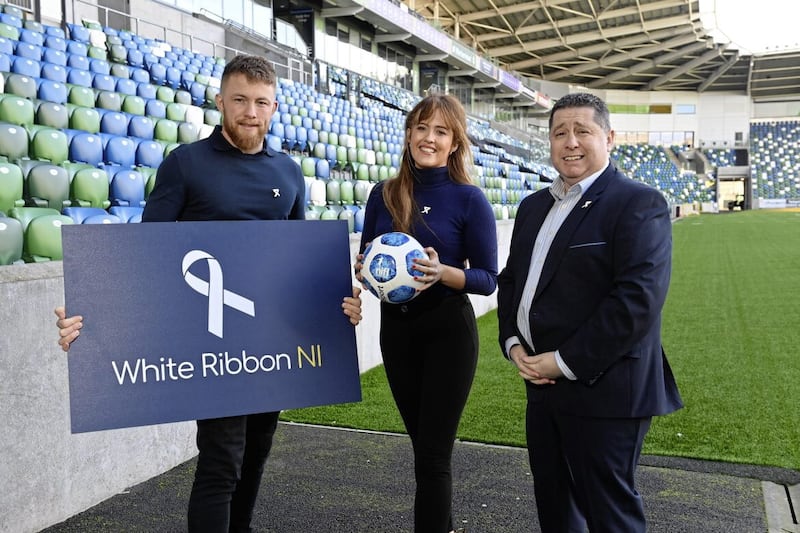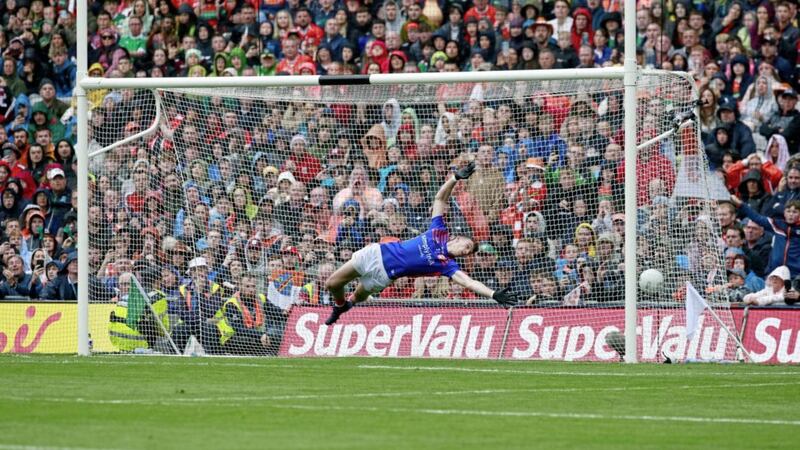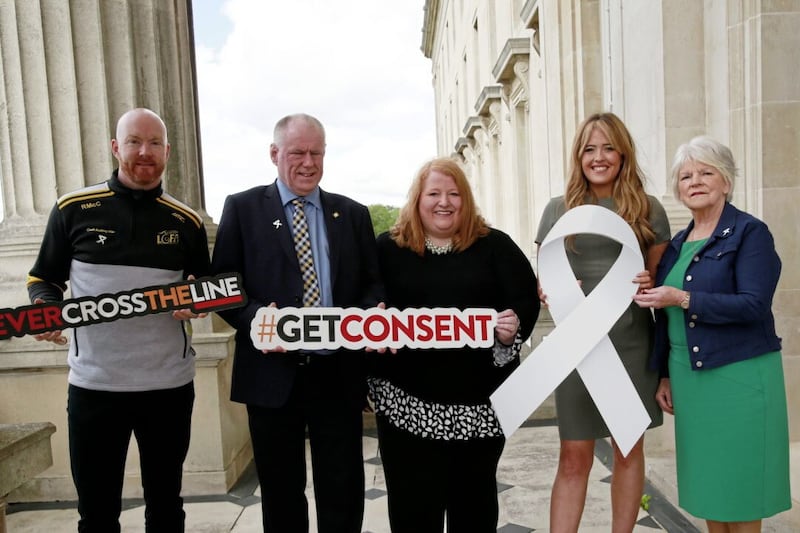IN the gloom of her early morning jog through the countryside, two men came running behind Tahnee McCorry – and started shouting: “We’re coming up behind you.”
Her heart already pounding, her adrenaline soared, before the strangers then called out: “We’re running past you.” And off they raced on their way, leaving her confused, but relieved.
That’s become a regular occurrence for the founder of White Ribbon NI. Tahnee already knew there were many good men around, but she’s continuing her work to educate more.
“There are so many good men, who want to help, this is my point.
”I would run quite early in the morning,” she explains. “It’s quite dusky.
“There’s a group of runners, and two in particular will always, as they’re coming up, will always shout, ‘We’re coming up behind you’, ‘We’re just running ahead’
“At first I thought, why are they doing that? Then I realised it’s because I’m on my own, they don’t want me to be scared by someone pounding - much faster than me, actually! – behind me.
“They call out in a friendly way, when they’re far away, that’s so respectful, that makes such a difference, as they run on way past me, waving nicely.
“That’s one story of how people can make a change in their own wee way. It’s having an effect on one girl, and I’m sure they do that for many more people.
“Having that understanding is about respect for our fellow human beings and the community that we all live in.
“Having each other’s backs. It’s not an ‘us and them’ mentality, and it’s important that we see that. It’s working as a community, the way we’re meant to.”
Of course, Tahnee wouldn’t be doing what she’s doing if all men were good.
Her involvement in sport is much more than as a casual runner.
White Ribbon is a global movement to end male violence against women. Formed by male students in Canada in 1991 after a massacre of 14 females, organisations have been set up around the worl d.
McCorry set up White Ribbon NI after having her eyes opened to violence against women and girls [VAWG] by Women’s Aid, as she recalls:
“I probably had quite a sheltered lifestyle…Had a brilliant upbringing, always had positive male influences: always saw my daddy or my granda, hard-working men.
“I’ve a really good relationship with my brother Vincent, who’s a volunteer for White Ribbon NI, despite working full-time at his own business. It may seem like I’ve coerced him into it but he actually enjoys the work!

“I always had a sense of justice as I grew up, what was right and what was wrong, a solid sense of the way things should be. I still have many positive male figures in my life, always had good relationships with men.”
That changed in an utterly unexpected way.
“It was only when I left school, working full-time, managing a team of girls, young women, in a small business, I started to talk them about their relationships, some of which weren’t healthy, some of which were abusive, and some of the dangers they faced when going out.
“I’m ashamed to say this now: it was a box-ticking exercise for myself. I thought I could probably do with some training, want to understand domestic abuse, want to understand violence against women and girls, so that if someone were to come forward to me and make a disclosure then I’d be able to help and do something in my job as a manager.
“I went to an awareness session at my local Women’s Aid office - and I was just horrified by the statistics in the presentation.
One in four
“One statistic that struck me was that one in four women will experience abuse in her lifetime.
“I left that office kind of in a daze, thinking ‘That was not what I expected. I expected to get a certificate and leave’,” she says with a laugh.
“I just saw my world widening, opening up so much.
“I realised the kind of healthy family life I had, not everybody has that. I started to realise what as going on, in Northern Ireland especially.
“I was so shocked and stunned. That ‘one in four’ kept ringing in my mind, and as I walked down the street I remember looking at all the women walking by, thinking ‘One in four…one in four’.
“When I went into a shop, I thought ‘One in four’.
When I went into the team of young women that I managed, I thought ‘One in four – and there’s 12 here. Who is experiencing this? What is going on? Who might not feel safe in their home or when they’re out?’
“I thought, ‘This is awful. I can’t have this knowledge and go about my normal, daily life.”
Tahnee went to local Women’s Aid office and became a volunteer, working in groups, offering court support, and so on.
“I realised I had other skills, and if I could open up the world to what I realised now, if I could ask people to come on board and help, then that would work well.
“As a Community Engagement worker with Women’s Aid, I’d go to churches and women’s organisations – but I started to think ‘What else can I do?’
“There’s half of the population that we’re not working with. Something is missing with the people we’re reaching out to.
“I cold-called sports organisations, teams, in my area, grassroots, gyms, boxing and MMA clubs, GAA clubs, as many as possible.
“The reaction I got was really good. They wanted to help, they listened to the statistics.”
Sport's power for good
Sport is known for its aggressive element, teaching players to dominate opponents, but McCorry sees other important aspects.
She believes in sport’s power to create camaraderie, loyalty, and support.
“Sports culture is part of our culture in general. Having these conversations in rooms where they hadn’t happened before could influence change.
“You can ‘preach to the choir’ - or go into organisations where conversations hadn’t been had.
“Coaches are role models for young people coming up, especially for young men… Young men are more influenced by their sports coach than by a famous celebrity; they look to coaches as role models, the men they’re around every day, to see how to act, how to work with the world.”
We met at the Larne Academy, in her native east Antrim, with Larne FC one of the clubs which has been especially supportive.
White Ribbon does not have a ‘one size fits all’ approach, McCorry points out: “They are all individual movements because every culture, every country is going to be different – in Northern Ireland we absolutely know that! We try to make it our own here…
“We’ve had a lot of success, the response has been really positive. Everyone we’ve reached out to said ‘Yeah, we want to help, but what way can we? And we never knew it was our place to…’
“We work with Ulster GAA, the Northern Ireland Football League, the IFA have made the [White Ribbon] pledge, we hope to do a lot more work with them.
“I’ve worked with schools, boxing clubs, MMA, gyms, all big parts of our culture but maybe not in this conversation before, but they absolutely should be, and that has brought us where we are now.
“We are reaching out with a lot of heart to change this and move towards positive change – because we know the statistics.
“If we can be one per cent better every day, move towards change that way, that’s where we’d like to see it.”
Tahnee McCorry, still only 34, is incredibly impressive – and positive.
Moving forward positively
She lives in the real world, not an idealised society, which makes White Ribbon NI’s approach extremely effective:
“There’s locker room talk and ‘banter’, all sports clubs identify that those attitudes and beliefs exist.
“To move forward positively, we need to give young people the tools to challenge them, rather than condemn them ‘Because you’re a GAA person, or a rugby person, you’re doing this’ – no, ‘You can be part of the solution’
“If we get a whole new outlook, how can we do that, how can we move forward, rather than think ‘sport is bad’.
“Actually so much in sports culture could be used as a tool within this: the sense of camaraderie, loyalty, community, could be used as tools towards change.”
'Get Consent' video, courtesy of UIster GAA
Having many more women playing and involved in sport is also a huge positive, she notes: “That’s massively important. It’s also important that more men are watching and supporting women’s sport. That leads us to equality.
“That’s what will help us cultivate a community which has each other’s backs, thinking ‘I want the best for this other person too, I want her to have the best possible experience and chance.’
“We can see Ulster GAA and the Northern Ireland Football League empowering women in sport…Having young girls see what they can be and aspire to.”
Much improvement still needed
Still, the positivity does not ignore the fact that much improvement is required in attitudes towards women and girls, she acknowledges:
“I think the attitudes and beliefs which perpetuate VAWG in NI exist in almost all organisations. Almost any organisation can be part of the solution to end VAWG.
“When we go into sports clubs and speak to young men and women, and people involved, we want to have conversations that are a catalyst for change.
“We want to address what are known as ‘rape myths’, address victim-blaming, want to have open conversations around those things, though; we don’t want to shut down people’s questions.
“We want to have a place where it’s safe to have a conversation about what’s going on in our community and think about ways that we can help.”
Harassment and coercive control
Violence isn’t just physical, never mind resulting in the awful murders which hit the headlines. Women and girls suffer in many other ways, including harassment and coercive control.
“Street harassment, coercive control, the things that people won’t always see as violence against women and girls, they’re massively important – and could have a massive effect on the person who’s being subjected to it.
“I think a UN study found that 80 per cent of women had experienced street harassment. I know how that feels.
“As a confident, older woman, that happens to me less – but the younger and more vulnerable I was, the more it happened. The most I experienced it, people calling out things, was when I was in my school uniform, and with my young son. I was horrified.
“Older women also experience a lot of abuse but don’t often recognise it as abuse a lot of the time. I worked on the ‘Older but no safer’ project for Women’s Aid, and it’s heart-breaking.
“One women came to a refuge aged 82, when she should be enjoying her life, being with her family.
“Coercive control, that kind of insidious abuse that can tear a person apart. The more we speak about that, the better…
“We want to give young people, especially, ways to be able to challenge disrespectful attitudes towards women and girls, misogynistic attitudes within their peer groups.
“We want to give people the tools to be able to actively challenge those – for example, within WhatsApp groups where there may be images being shared, not consensually, or maybe disrespectful attitudes or perhaps even ‘jokes’ going through, what way they can challenge that, and use ‘bystander intervention’ to stand up against VAWG and the attitudes and beliefs which perpetuate it.”
'Listen, Learn, Lead'
White Ribbon NI’s workshops, which are funded by the Department of Justice’s asset recovery community scheme, encourage females to have their say – and males too, but also to hear those stories from women and girls:
“Workshops are split into three parts, ‘Listen, Learn, Lead’ and a massive part of ‘Listen’ is listening to the voices of women, understanding their stories, but also building that empathy for women.
“It’s about understanding why a woman suffering domestic abuse might not want to come forward or make a disclosure or ever tell anybody.
“She knows she’s falling apart, she knows her confidence has hit rock-bottom, she knows every part of her life is being controlled, but she might not explain it as ‘abuse’ – and she might blame herself, and think she’s going crazy, or be ‘gaslit’ into thinking she is going crazy.
“To have those conversations especially with young men on sports teams, we get some great interaction about that, and building empathy is important. They’ll tell stories themselves.
“I feel that’s going to be the answer: having those kinds of conversations, building empathy, and understanding the experiences of a woman as she goes through them.”
White Ribbon NI has done much already, but Tahnee insists: “We need to do a massive amount more. We run on really low costs, we do as many workshop as possible. We’ve got funding from ARCS [Assets Recovery Community Scheme], from the Lottery
“Our partner organisations do some fund-raising for us too; male-dominated organisations fund-raising to end VAWG sends out an important message, so we’re extremely grateful.
“But Northern Ireland is the only part of the UK without an Ending Violence Against Women and Girls Strategy, we’d like to see that rolled out and funded, especially in terms of prevention work.”
Tahnee McCorry and White Ribbon NI are shining important lights, but there are still dark ways in our society.
“Understanding also what it’s like to walk home by yourself at night, for example.
“I remember I had an experience not that long ago myself, where I was walking with my dog in the dark, and he’s not a guard dog.
“I could sense someone walking slower towards me, so I thought ‘Right, I’ll turn’; and they turned at the same time as me. I’m not ashamed to say I just ran, I just ran.
“To feed back those kinds of stories and say how that feels when you’re out and about. Think about stories you’ve seen, heard, and read in the media. Think about the statistics, that fear about being able to get home safely.”
The journey towards ending violence against women and girls is underway, with White Ribbon NI providing the lead – but there’s still a long distance to travel.
Website: whiteribbonni.org
Email: events@whiteribbonni.org
https://ulster.gaa.ie/health/programmes/nevercrosstheline/
6 Counties: https://www.nidirect.gov.uk/articles/support-services-victims
26 Counties: https://www.gov.ie/en/organisation-information/9f23e-domestic-sexual-gender-based-violence/





